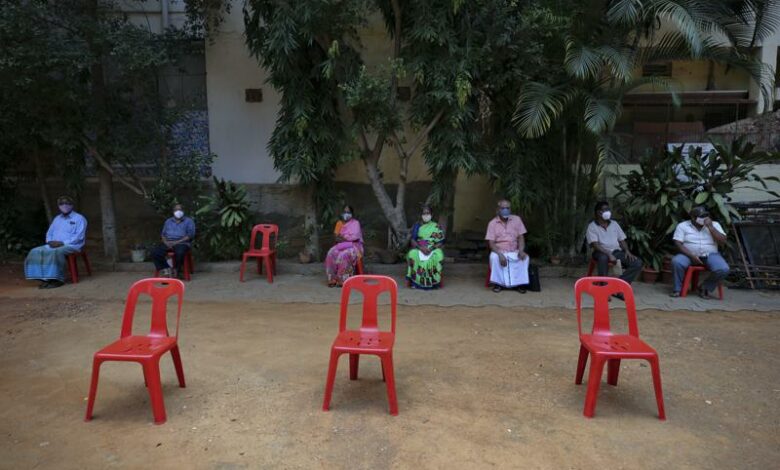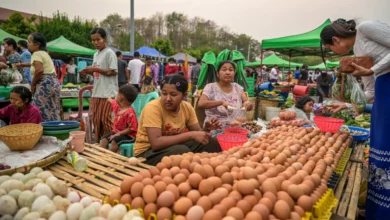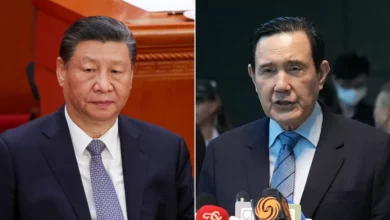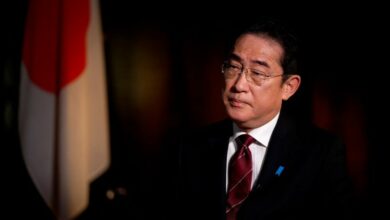
SEOUL, South Korea — South Korean officials say they plan to allow people to drop their masks from July if they have received at least one dose of a coronavirus vaccine, as they mull incentives to promote inoculation.
Health Minister Kwon Deok-choel said Wednesday the plan is contingent on the government succeeding in its goal of administering first doses to 13 million people by the end of June. Officials say people will continue to be required to wear mask indoors or at outdoor gatherings where it’s difficult to maintain distance.
Other incentives include providing vaccine-takers with discounts at public parks and museums and allowing them to participate in larger private gatherings. The country is currently clamping down on social gatherings of five or more people.
South Korea has wrestled with a slower vaccine rollout than many other developed economies.
Around 3.9 million people so far have received their first doses since the country launched its mass immunization program in late February, which represents less than 8% of the country’s 51 million population.
Health officials have lamented what they describe as excessive public fear of the AstraZeneca vaccine, which has been linked to rare blood-clotting side effects.
___
COLOMBO, Sri Lanka — Sri Lanka has received 500,000 doses of Sinopharm coronavirus vaccine donated by China as the Indian Ocean island nation faces severe shortage of vaccines amid a recent rise in infections.
The vaccine stock that arrived early Wednesday is the second donation from China, following a shipment of 600,000 doses in March.
Sri Lanka is facing a shortage of vaccine after the producer in neighboring India failed to provide the promised Oxford-AstraZeneca vaccine stocks. The government on Tuesday agreed to buy 14 million doses of Sinopharm from China.
The current vaccination program is focused on Sri Lanka’s Western province, which includes the capital of Colombo and its suburbs. It is where the majority of the country’s coronavirus cases have been.
Sri Lanka so far has reported 167,172 coronavirus cases and 1,243 deaths from COVID-19.
___
HONOLULU — Hawaii is no longer requiring people to wear face masks outdoors as the number of coronavirus cases drops and more people get vaccinated.
Gov. David Ige said Tuesday that he will maintain a requirement that people wear masks indoors, whether or not someone is vaccinated. He also says he will encourage people who are in large groups outdoors to continue to wear masks.
Ige says that starting June 1, he will allow ocean sports competitions like surfing contests and canoe paddling races to take place.
The governor says 57% of Hawaii’s residents have received at least one dose of coronavirus vaccine while just under half the population has been fully vaccinated.
___
PORTLAND, Ore. — For the first time in months, restaurants in Oregon’s most populous county — home to Portland — will open for 50% capacity for indoor dining after meeting vaccination goals.
Gov. Kate Brown announced Tuesday that half of Oregon’s counties, including Multnomah County, will move to the “lower risk” level Thursday.
This category allows a significant reduction in pandemic restrictions — allowing 50% capacity for indoor dinging, theaters, gyms and other indoor entertainment spaces. It also expands indoor gatherings to 10 people and retail store capacity to 75%.
Currently, more than half of Oregon’s eligible population who are 16 or older have received at least a first dose of coronavirus vaccine.
___
UNITED NATIONS — The United Nations humanitarian chief says that despite last year’s U.N. call for global cease-fires to tackle the COVID-19 pandemic, many conflicts never stopped, including in Syria, Yemen and Congo and new ones erupted.
Mark Lowcock told the U.N. Security Council on Tuesday that this has made it more difficult to control the spread of the coronavirus and care for infected people in many countries. He cites “multiple reports of atrocities” against civilians caught in conflicts during the pandemic.
Lowcock says insecurity, sanctions, counter-terrorism measures and administrative hurdles are hindering humanitarian operations. And he says the pandemic has made aid deliveries worse because of suspended flights, border closures, quarantine measures and lockdowns.
___
HERE’S WHAT ELSE IS HAPPENING:
BATON ROUGE, La. — Gov. John Bel Edwards is scrapping nearly every remaining coronavirus restriction in Louisiana and lifting the statewide requirement that students must wear a mask in the classroom and at school events.
The Democratic governor announced Tuesday that he’ll keep the statewide public health emergency declaration in place. But Louisiana will have almost none of the rules governing businesses and behavior over the last 15 months of the pandemic.
Edwards cited the wide availability of the coronavirus vaccine in Louisiana.
Masks still will be required on public transit, in health care facilities and in prisons. Schools, businesses and local government officials can decide if they want to mandate masks.
___
WAILUKU, Hawaii — Police in Hawaii say an Oregon woman was arrested last week because she violated travel quarantine rules meant to protect the islands from the spread of coronavirus.
Maui police say 36-year-old Kelsey Newcomer didn’t have a negative COVID-19 test from an approved facility when she arrived on a flight from Seattle. Police say she also didn’t have approved lodging where she could complete at 10-day mandatory quarantine.
She was taken to a police station and later agreed to leave the island of Maui and return to Oregon. Travelers to Hawaii must comply with the state’s pre-travel testing program, even those who are fully vaccinated against COVID-19.
She couldn’t immediately be reached for comment Tuesday.
___
HARTFORD, Conn. — A judge has upheld Connecticut’s requirement that children wear masks in schools, rejecting a challenge by some parents who say mask wearing can be harmful and education officials exceeded their authority.
A Superior Court judge in Hartford released his ruling Monday in response to a lawsuit filed by the CT Freedom Alliance and several parents and their children. The decision affirms the legitimacy of mask requirements in schools this academic year but does not give guidance for the next school year.
The CT Freedom Alliance says it will appeal the ruling to the state Supreme Court, saying they can cause students distress and falsely claiming they are not useful despite assurances from the U.S. Centers for Disease Control and Prevention and other health experts that masks help prevent spread of the coronavirus.
___
DENVER — Colorado will have a weekly lottery for five residents to win $1 million to incentivize COVID-19 vaccinations.
Gov. Jared Polis said Tuesday that the state is setting aside $5 million of federal coronavirus relief funds that would have gone toward vaccine advertising for five residents to win $1 million each. The drawings will take place every week starting June 4 until July 7.
Every resident who has been vaccinated by the end of May will be entered in the first drawing. In order to be eligible for the drawing, residents need to be at least 18 years old and have received at least one dose of the approved coronavirus vaccines.
___
LITTLE ROCK, Ark. — Arkansas will be giving lottery tickets and gift certificates for hunting and fishing licenses to people who get the coronavirus vaccine.
Gov. Asa Hutchinson says $20 scratch-off lottery tickets or $20 Game and Fish gift certificates will be offered to residents who get the first dose of the vaccine starting Tuesday.
The incentives will be available starting June 1 at local health units or special events around the state.
Arkansas has had one of the lowest vaccination rates in the country and Tuesday’s announcement follows efforts in other states to offer incentives.
___
WASHINGTON — White House coronavirus adviser Andy Slavitt says “we need to get to the bottom” of the origins of the pandemic pathogen and the World Health Organization and China need to do more to provide definitive answers for the global community.
The precise origin of the virus remains undetermined and speculation has reigned about whether it jumped from animals to humans or whether it could have escaped from a Chinese government lab in Wuhan, the city that saw the first outbreak.
“We need a completely transparent process from China,” Slavitt said at Tuesday’s coronavirus task force briefing. Full assistance from the WHO is needed, and “we don’t have that now.”
Dr. Anthony Fauci said “many of us” feel like it was a natural occurrence, but “we don’t know 100%” and it is imperative to investigate.
___
MEXICO CITY — San Diego County and private businesses have donated 10,000 coronavirus vaccines to vaccinate workers at U.S.-owned border assembly plants in Tijuana.
Foreign Relations Secretary Marcelo Ebrard says the program is aimed at helping equalize vaccination rates at closely connected points along the U.S.-Mexico border.
“This is the first cross-border agreement we have had. This is surely going to grow a lot,” Ebrard said. “We plan to replicate this all along the border.”
The vaccines are being administered by medical personnel from the University of California, San Diego, at the San Ysidro border crossing. The program started Monday with about 150 to 200 shots administered per hour.
Mexico has had a shortage of COVID-19 vaccines, and has received only about 34.2 million doses for a population of 126 million. Since most vaccines require two doses, Mexico has only vaccinated about 15% of its population so far.




